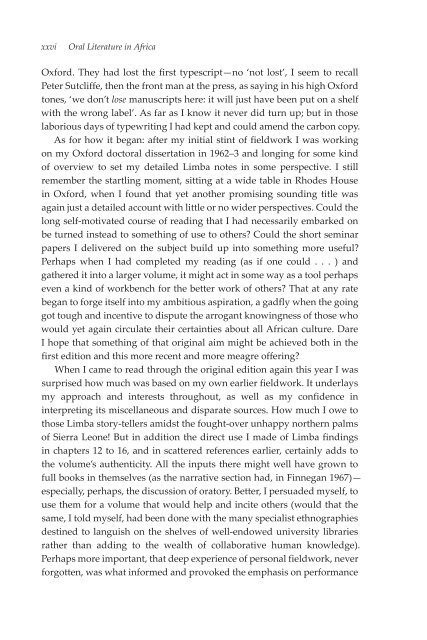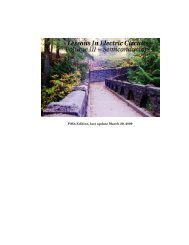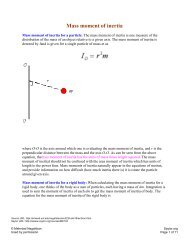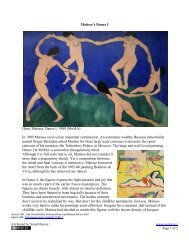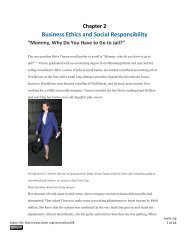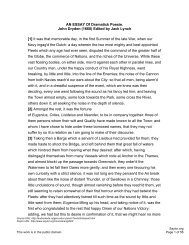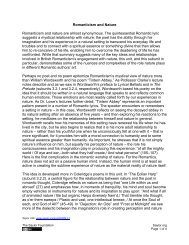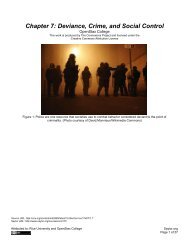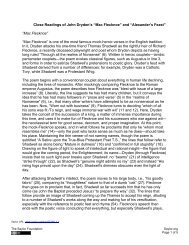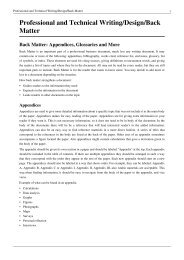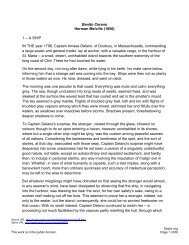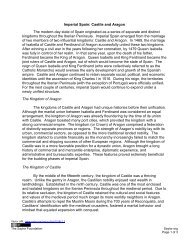- Page 1 and 2: W o r l d O r a l L i t e r a t u r
- Page 3 and 4: The praise singer Mqhyai, distingui
- Page 5 and 6: Open Book Publishers CIC Ltd., 40 D
- Page 8: Ruth Finnegan is a Visiting Researc
- Page 11 and 12: x Oral Literature in Africa 5. Pane
- Page 13 and 14: Online Resources This volume is com
- Page 15 and 16: xiv Oral Literature in Africa Figur
- Page 17 and 18: Figure 1. Dancer, West Africa (phot
- Page 19 and 20: xviii Oral Literature in Africa to
- Page 21: xx Oral Literature in Africa online
- Page 24 and 25: Preface Ruth Finnegan When I first
- Page 28 and 29: Preface to the Second Edition xxvii
- Page 30 and 31: Preface to the Second Edition xxix
- Page 32 and 33: Preface to the Second Edition xxxi
- Page 34 and 35: Preface to the Second Edition xxxii
- Page 36 and 37: Acknowledgements I have many thanks
- Page 38: Acknowledgements xxxvii M. Pierre V
- Page 42 and 43: Abbreviations Besides the normal ab
- Page 44: Note on Sources and References Only
- Page 48 and 49: 1. The ‘Oral’ Nature of African
- Page 50 and 51: 1. The ‘Oral’ Nature of African
- Page 52 and 53: 1. The ‘Oral’ Nature of African
- Page 54 and 55: 1. The ‘Oral’ Nature of African
- Page 56 and 57: 1. The ‘Oral’ Nature of African
- Page 58 and 59: 1. The ‘Oral’ Nature of African
- Page 60 and 61: 1. The ‘Oral’ Nature of African
- Page 62 and 63: 1. The ‘Oral’ Nature of African
- Page 64 and 65: 1. The ‘Oral’ Nature of African
- Page 66 and 67: 1. The ‘Oral’ Nature of African
- Page 68 and 69: 1. The ‘Oral’ Nature of African
- Page 70 and 71: 1. The ‘Oral’ Nature of African
- Page 72: 1. The ‘Oral’ Nature of African
- Page 75 and 76: 30 Oral Literature in Africa In fac
- Page 77 and 78:
32 Oral Literature in Africa publis
- Page 79 and 80:
34 Oral Literature in Africa [an] e
- Page 81 and 82:
36 Oral Literature in Africa record
- Page 83 and 84:
38 Oral Literature in Africa compar
- Page 85 and 86:
40 Oral Literature in Africa ‘sur
- Page 87 and 88:
42 Oral Literature in Africa Boas a
- Page 89 and 90:
44 Oral Literature in Africa previo
- Page 91 and 92:
46 Oral Literature in Africa been a
- Page 93 and 94:
48 Oral Literature in Africa Figure
- Page 96 and 97:
3. The Social, Linguistic, and Lite
- Page 98 and 99:
3. The Social, Linguistic, and Lite
- Page 100 and 101:
3. The Social, Linguistic, and Lite
- Page 102 and 103:
3. The Social, Linguistic, and Lite
- Page 104 and 105:
3. The Social, Linguistic, and Lite
- Page 106 and 107:
3. The Social, Linguistic, and Lite
- Page 108 and 109:
3. The Social, Linguistic, and Lite
- Page 110 and 111:
3. The Social, Linguistic, and Lite
- Page 112 and 113:
3. The Social, Linguistic, and Lite
- Page 114 and 115:
3. The Social, Linguistic, and Lite
- Page 116 and 117:
3. The Social, Linguistic, and Lite
- Page 118 and 119:
3. The Social, Linguistic, and Lite
- Page 120 and 121:
3. The Social, Linguistic, and Lite
- Page 122 and 123:
3. The Social, Linguistic, and Lite
- Page 124 and 125:
3. The Social, Linguistic, and Lite
- Page 126:
II. POETRY
- Page 129 and 130:
84 Oral Literature in Africa In fac
- Page 131 and 132:
86 Oral Literature in Africa was ex
- Page 133 and 134:
88 Oral Literature in Africa In spi
- Page 135 and 136:
90 Oral Literature in Africa The po
- Page 137 and 138:
92 Oral Literature in Africa were p
- Page 139 and 140:
94 Oral Literature in Africa Such i
- Page 141 and 142:
96 Oral Literature in Africa freque
- Page 143 and 144:
98 Oral Literature in Africa Those
- Page 145 and 146:
100 Oral Literature in Africa Withi
- Page 147 and 148:
102 Oral Literature in Africa Other
- Page 149 and 150:
104 Oral Literature in Africa the d
- Page 151 and 152:
106 Oral Literature in Africa V We
- Page 153 and 154:
108 Oral Literature in Africa To ot
- Page 155 and 156:
110 Oral Literature in Africa of so
- Page 157 and 158:
112 Oral Literature in Africa goes
- Page 159 and 160:
114 Oral Literature in Africa Ogun
- Page 161 and 162:
116 Oral Literature in Africa prais
- Page 163 and 164:
118 Oral Literature in Africa The o
- Page 165 and 166:
120 Oral Literature in Africa frien
- Page 167 and 168:
122 Oral Literature in Africa and t
- Page 169 and 170:
124 Oral Literature in Africa He is
- Page 171 and 172:
126 Oral Literature in Africa Here,
- Page 173 and 174:
128 Oral Literature in Africa three
- Page 175 and 176:
130 Oral Literature in Africa prais
- Page 177 and 178:
132 Oral Literature in Africa Thoug
- Page 179 and 180:
134 Oral Literature in Africa (Kano
- Page 181 and 182:
136 Oral Literature in Africa Somet
- Page 183 and 184:
138 Oral Literature in Africa Whate
- Page 185 and 186:
140 Oral Literature in Africa of ex
- Page 187 and 188:
142 Oral Literature in Africa with
- Page 190 and 191:
6. Elegiac Poetry General and intro
- Page 192 and 193:
6. Elegiac Poetry 147 Figure 12. Fu
- Page 194 and 195:
6. Elegiac Poetry 149 Only one, bel
- Page 196 and 197:
6. Elegiac Poetry 151 and its compl
- Page 198 and 199:
6. Elegiac Poetry 153 Katakyie (‘
- Page 200 and 201:
6. Elegiac Poetry 155 Rather simila
- Page 202 and 203:
6. Elegiac Poetry 157 (d) (e) Grand
- Page 204 and 205:
6. Elegiac Poetry 159 My children a
- Page 206 and 207:
6. Elegiac Poetry 161 of the voice
- Page 208:
6. Elegiac Poetry 163 is only towar
- Page 211 and 212:
166 Oral Literature in Africa poetr
- Page 213 and 214:
168 Oral Literature in Africa throu
- Page 215 and 216:
170 Oral Literature in Africa After
- Page 217 and 218:
172 Oral Literature in Africa In fo
- Page 219 and 220:
174 Oral Literature in Africa When
- Page 221 and 222:
176 Oral Literature in Africa Propr
- Page 223 and 224:
178 Oral Literature in Africa As th
- Page 225 and 226:
180 Oral Literature in Africa and p
- Page 227 and 228:
182 Oral Literature in Africa is th
- Page 229 and 230:
184 Oral Literature in Africa of th
- Page 231 and 232:
186 Oral Literature in Africa Jealo
- Page 233 and 234:
188 Oral Literature in Africa under
- Page 235 and 236:
190 Oral Literature in Africa It is
- Page 237 and 238:
192 Oral Literature in Africa (some
- Page 239 and 240:
194 Oral Literature in Africa quote
- Page 241 and 242:
196 Oral Literature in Africa This
- Page 243 and 244:
198 Oral Literature in Africa of di
- Page 245 and 246:
200 Oral Literature in Africa conte
- Page 247 and 248:
202 Oral Literature in Africa betwe
- Page 249 and 250:
204 Oral Literature in Africa The b
- Page 251 and 252:
206 Oral Literature in Africa But t
- Page 253 and 254:
208 Oral Literature in Africa The N
- Page 255 and 256:
210 Oral Literature in Africa of th
- Page 257 and 258:
212 Oral Literature in Africa Fire!
- Page 259 and 260:
214 Oral Literature in Africa A hig
- Page 261 and 262:
216 Oral Literature in Africa of th
- Page 263 and 264:
218 Oral Literature in Africa Does
- Page 265 and 266:
220 Oral Literature in Africa Even
- Page 267 and 268:
222 Oral Literature in Africa and t
- Page 269 and 270:
224 Oral Literature in Africa III S
- Page 271 and 272:
226 Oral Literature in Africa The w
- Page 273 and 274:
228 Oral Literature in Africa and s
- Page 275 and 276:
230 Oral Literature in Africa or: S
- Page 277 and 278:
232 Oral Literature in Africa This
- Page 279 and 280:
234 Oral Literature in Africa indiv
- Page 281 and 282:
236 Oral Literature in Africa I Son
- Page 283 and 284:
238 Oral Literature in Africa Popul
- Page 285 and 286:
240 Oral Literature in Africa The g
- Page 287 and 288:
242 Oral Literature in Africa a con
- Page 289 and 290:
244 Oral Literature in Africa morni
- Page 291 and 292:
246 Oral Literature in Africa Marri
- Page 293 and 294:
248 Oral Literature in Africa Longs
- Page 295 and 296:
250 Oral Literature in Africa mood
- Page 297 and 298:
252 Oral Literature in Africa Ever
- Page 299 and 300:
254 Oral Literature in Africa depen
- Page 301 and 302:
256 Oral Literature in Africa group
- Page 303 and 304:
258 Oral Literature in Africa songs
- Page 305 and 306:
260 Oral Literature in Africa There
- Page 307 and 308:
262 Oral Literature in Africa types
- Page 310 and 311:
10. Topical and Political Songs Top
- Page 312 and 313:
10. Topical and Political Songs 267
- Page 314 and 315:
10. Topical and Political Songs 269
- Page 316 and 317:
10. Topical and Political Songs 271
- Page 318 and 319:
10. Topical and Political Songs 273
- Page 320 and 321:
10. Topical and Political Songs 275
- Page 322 and 323:
10. Topical and Political Songs 277
- Page 324 and 325:
10. Topical and Political Songs 279
- Page 326 and 327:
10. Topical and Political Songs 281
- Page 328 and 329:
10. Topical and Political Songs 283
- Page 330 and 331:
10. Topical and Political Songs 285
- Page 332 and 333:
10. Topical and Political Songs 287
- Page 334 and 335:
10. Topical and Political Songs 289
- Page 336 and 337:
11. Children’s Songs and Rhymes L
- Page 338 and 339:
11. Children’s Songs and Rhymes 2
- Page 340 and 341:
11. Children’s Songs and Rhymes 2
- Page 342 and 343:
11. Children’s Songs and Rhymes 2
- Page 344 and 345:
11. Children’s Songs and Rhymes 2
- Page 346 and 347:
11. Children’s Songs and Rhymes 3
- Page 348 and 349:
11. Children’s Songs and Rhymes 3
- Page 350:
III. PROSE
- Page 353 and 354:
308 Oral Literature in Africa stori
- Page 355 and 356:
310 Oral Literature in Africa The i
- Page 357 and 358:
312 Oral Literature in Africa in ge
- Page 359 and 360:
314 Oral Literature in Africa man;
- Page 361 and 362:
316 Oral Literature in Africa said
- Page 363 and 364:
318 Oral Literature in Africa a neg
- Page 365 and 366:
320 Oral Literature in Africa audie
- Page 367 and 368:
322 Oral Literature in Africa from
- Page 369 and 370:
324 Oral Literature in Africa clear
- Page 372 and 373:
13. Prose Narratives II. Content an
- Page 374 and 375:
13. Prose Narratives II. Content an
- Page 376 and 377:
13. Prose Narratives II. Content an
- Page 378 and 379:
13. Prose Narratives II. Content an
- Page 380 and 381:
13. Prose Narratives II. Content an
- Page 382 and 383:
13. Prose Narratives II. Content an
- Page 384 and 385:
13. Prose Narratives II. Content an
- Page 386 and 387:
13. Prose Narratives II. Content an
- Page 388 and 389:
13. Prose Narratives II. Content an
- Page 390 and 391:
13. Prose Narratives II. Content an
- Page 392 and 393:
13. Prose Narratives II. Content an
- Page 394 and 395:
13. Prose Narratives II. Content an
- Page 396 and 397:
13. Prose Narratives II. Content an
- Page 398 and 399:
13. Prose Narratives II. Content an
- Page 400 and 401:
13. Prose Narratives II. Content an
- Page 402 and 403:
13. Prose Narratives II. Content an
- Page 404 and 405:
13. Prose Narratives II. Content an
- Page 406 and 407:
13. Prose Narratives II. Content an
- Page 408 and 409:
13. Prose Narratives II. Content an
- Page 410 and 411:
13. Prose Narratives II. Content an
- Page 412 and 413:
13. Prose Narratives II. Content an
- Page 414 and 415:
13. Prose Narratives II. Content an
- Page 416 and 417:
13. Prose Narratives II. Content an
- Page 418 and 419:
13. Prose Narratives II. Content an
- Page 420 and 421:
13. Prose Narratives II. Content an
- Page 422 and 423:
13. Prose Narratives II. Content an
- Page 424 and 425:
14. Proverbs The significance and c
- Page 426 and 427:
14. Proverbs 381 In some languages
- Page 428 and 429:
14. Proverbs 383 that these sayings
- Page 430 and 431:
14. Proverbs 385 (i.e. they protect
- Page 432 and 433:
14. Proverbs 387 idea that people r
- Page 434 and 435:
14. Proverbs 389 The actual wording
- Page 436 and 437:
14. Proverbs 391 recalled in their
- Page 438 and 439:
14. Proverbs 393 West Africa where
- Page 440 and 441:
14. Proverbs 395 a detailed example
- Page 442 and 443:
14. Proverbs 397 generalizing funct
- Page 444 and 445:
14. Proverbs 399 a formal law case,
- Page 446 and 447:
14. Proverbs 401 way through the us
- Page 448 and 449:
14. Proverbs 403 asking—interpret
- Page 450 and 451:
14. Proverbs 405 for more elaborate
- Page 452 and 453:
14. Proverbs 407 (sea, plant, etc.)
- Page 454 and 455:
14. Proverbs 409 truthful, or angry
- Page 456:
14. Proverbs 411 words and form, th
- Page 459 and 460:
414 Oral Literature in Africa I In
- Page 461 and 462:
416 Oral Literature in Africa In th
- Page 463 and 464:
418 Oral Literature in Africa couch
- Page 465 and 466:
420 Oral Literature in Africa same
- Page 467 and 468:
422 Oral Literature in Africa descr
- Page 469 and 470:
424 Oral Literature in Africa the s
- Page 471 and 472:
426 Oral Literature in Africa Equat
- Page 473 and 474:
428 Oral Literature in Africa think
- Page 476 and 477:
16. Oratory, Formal Speaking, and o
- Page 478 and 479:
16. Oratory, Formal Speaking, and o
- Page 480 and 481:
16. Oratory, Formal Speaking, and o
- Page 482 and 483:
16. Oratory, Formal Speaking, and o
- Page 484 and 485:
16. Oratory, Formal Speaking, and o
- Page 486 and 487:
16. Oratory, Formal Speaking, and o
- Page 488 and 489:
16. Oratory, Formal Speaking, and o
- Page 490 and 491:
16. Oratory, Formal Speaking, and o
- Page 492 and 493:
16. Oratory, Formal Speaking, and o
- Page 494 and 495:
16. Oratory, Formal Speaking, and o
- Page 496 and 497:
16. Oratory, Formal Speaking, and o
- Page 498 and 499:
16. Oratory, Formal Speaking, and o
- Page 500 and 501:
16. Oratory, Formal Speaking, and o
- Page 502 and 503:
16. Oratory, Formal Speaking, and o
- Page 504 and 505:
16. Oratory, Formal Speaking, and o
- Page 506 and 507:
16. Oratory, Formal Speaking, and o
- Page 508 and 509:
16. Oratory, Formal Speaking, and o
- Page 510:
IV. SOME SPECIAL FORMS
- Page 513 and 514:
468 Oral Literature in Africa be fu
- Page 515 and 516:
470 Oral Literature in Africa an al
- Page 517 and 518:
472 Oral Literature in Africa Make
- Page 519 and 520:
474 Oral Literature in Africa can b
- Page 521 and 522:
476 Oral Literature in Africa When
- Page 523 and 524:
478 Oral Literature in Africa recal
- Page 525 and 526:
480 Oral Literature in Africa Where
- Page 527 and 528:
482 Oral Literature in Africa III D
- Page 529 and 530:
484 Oral Literature in Africa view
- Page 531 and 532:
486 Oral Literature in Africa histo
- Page 533 and 534:
488 Oral Literature in Africa chara
- Page 535 and 536:
490 Oral Literature in Africa arriv
- Page 537 and 538:
492 Oral Literature in Africa woman
- Page 539 and 540:
494 Oral Literature in Africa can b
- Page 541 and 542:
496 Oral Literature in Africa masks
- Page 543 and 544:
498 Oral Literature in Africa brevi
- Page 545 and 546:
500 Oral Literature in Africa V How
- Page 548 and 549:
Conclusion Several points emerge fr
- Page 550 and 551:
Conclusion 505 This oral literature
- Page 553 and 554:
508 Oral Literature in Africa
- Page 556 and 557:
Bibliography A. General Reference W
- Page 558 and 559:
Bibliography 513 —, South African
- Page 560 and 561:
Bibliography 515 BASCOM, W. R., ‘
- Page 562 and 563:
Bibliography 517 BLEEK, W. H. I., R
- Page 564 and 565:
Bibliography 519 —, ‘Poetry of
- Page 566 and 567:
Bibliography 521 —, and DUMESTRE
- Page 568 and 569:
Bibliography 523 —, ‘New Modes
- Page 570 and 571:
Bibliography 525 International de l
- Page 572 and 573:
Bibliography 527 HINAWY M. A., Al-A
- Page 574 and 575:
Bibliography 529 —, ‘The epic o
- Page 576 and 577:
Bibliography 531 KNAPPERT, J., ‘T
- Page 578 and 579:
Bibliography 533 LY, A., L’Épop
- Page 580 and 581:
Bibliography 535 MULOKOZI, MUGYABUS
- Page 582 and 583:
Bibliography 537 PATTERSON, J. R.,
- Page 584 and 585:
Bibliography 539 —, ‘The Attitu
- Page 586 and 587:
Bibliography 541 —, ‘Eerste glu
- Page 588 and 589:
Bibliography 543 —, ‘The develo
- Page 590:
Bibliography 545 WESTERMANN, D., Sh
- Page 593 and 594:
548 Oral Literature in Africa Ameri
- Page 595 and 596:
550 Oral Literature in Africa Cerul
- Page 597 and 598:
552 Oral Literature in Africa dialo
- Page 599 and 600:
554 Oral Literature in Africa Games
- Page 601 and 602:
556 Oral Literature in Africa See a
- Page 603 and 604:
558 Oral Literature in Africa diffi
- Page 605 and 606:
560 Oral Literature in Africa Mwera
- Page 607 and 608:
562 Oral Literature in Africa in sp
- Page 609 and 610:
564 Oral Literature in Africa rheto
- Page 611 and 612:
566 Oral Literature in Africa in or
- Page 613 and 614:
568 Oral Literature in Africa Werne
- Page 615 and 616:
nickt, SarahHoughton, MichelledeVil


